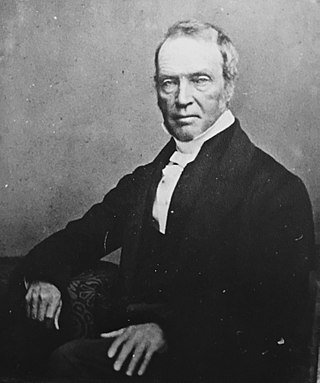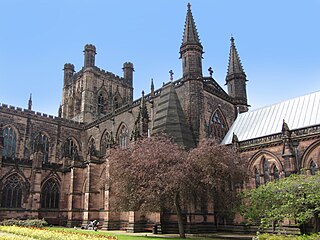Related Research Articles
The Lord High Chancellor of Ireland was the highest judicial office in Ireland until the establishment of the Irish Free State in 1922. From 1721 to 1801, it was also the highest political office of the Irish Parliament: the Chancellor was Speaker of the Irish House of Lords. The Lord Chancellor was also Lord Keeper of the Great Seal of Ireland. In all three respects, the office mirrored the Lord High Chancellor of Great Britain.

John Bowes, 1st Baron Bowes PC (I) was an Anglo-Irish peer, politician and judge. He was noted for his great legal ability, but also for his implacable hostility to Roman Catholics.

Robert Jocelyn, 1st Viscount Jocelyn PC (I) SL was an Anglo-Irish politician and judge and member of the Peerage of Ireland, best known for serving as Lord Chancellor of Ireland.

Richard West was an English barrister, judge, playwright and politician who sat in the House of Commons from 1721 to 1726. He served as Lord Chancellor of Ireland from 1725 to 1726, succeeding Alan Brodrick, 1st Viscount Midleton.
Nehemiah Donnellan was an Irish lawyer and judge.

Thomas Wyndham, 1st Baron Wyndham PC, was an Irish lawyer and politician. He served as Lord Chancellor of Ireland from 1726 to 1739.
Sir Maziere Brady, 1st Baronet, PC (Ire) was an Irish judge, notable for his exceptionally long, though not particularly distinguished tenure as Lord Chancellor of Ireland.

Richard Wilson Greene PC, KC (1791–1861) was an Irish barrister and judge.
John Rogerson (1676–1741) was an Irish politician, lawyer, and judge who became Solicitor-General, Attorney-General for Ireland, and Lord Chief Justice of the King's Bench in Ireland.
Sir Bernard Hale (1677–1729) was an English-born barrister and judge who became Chief Baron of the Irish Exchequer. Two of his sons became Generals in the British Army.

Sir Jeffrey Gilbert (1674–1726) was an English barrister, judge and author who held office as Lord Chief Baron of the Exchequer in both Ireland and England. While he was serving as a judge in Ireland, a routine judgment he delivered unexpectedly led to a major political crisis, as a result of which he was briefly imprisoned. He later became renowned for his legal treatises, none of which were published in his lifetime.
Sir James Reynolds (1684–1747) was an English judge who had a distinguished career in both Ireland and England, holding the office of Chief Justice of the Irish Common Pleas and subsequently Baron of the Exchequer in England. He should not be confused with his close relative Sir James Reynolds, junior, who was Chief Baron of the Exchequer from 1730 to 1738.

The Court of Exchequer (Ireland), or the Irish Exchequer of Pleas, was one of the senior courts of common law in Ireland. It was the mirror image of the equivalent court in England. The Court of Exchequer was one of the four royal courts of justice which gave their name to the building in Dublin in which they were located, which is still called the Four Courts, and is in use as a courthouse.
Walter de Islip, Isleep or de Istlep was an English-born cleric, statesman, and judge in fourteenth-century Ireland. He was the first Chief Baron of the Irish Exchequer; he also held the offices of Treasurer of Ireland, Chief Escheator, and Custos Rotulorum of Kilkenny. He was a noted pluralist, who held numerous benefices. His career was seriously damaged by accusations of corruption and maladministration. He played an important role in the celebrated Kilkenny Witchcraft Trials of 1324.
Patrick Bermingham (c.1460–1532) was an Irish judge and statesman of the Tudor period who held the offices of Lord Chief Justice of Ireland and Chancellor of the Exchequer of Ireland. He was a firm supporter of English rule in Ireland and enjoyed the confidence of Henry VIII, who regarded him as a mainstay of the Irish administration.
Nicholas de Balscote was an English-born official and judge in fourteenth-century Ireland. He attained high judicial office, but his career was damaged by a quarrel with King Edward II.
Robert le Poer was an Irish judge and Crown official who held the offices of Lord High Treasurer of Ireland and Chief Baron of the Irish Exchequer.
Clement Fitzleones, FitzLyons, or Leones was an Irish lawyer and judge. He held the offices of Serjeant-at-law (Ireland) and Attorney-General for Ireland and was briefly Deputy to the Chief Baron of the Irish Exchequer.
The archdeacon of Meath is a senior ecclesiastical officer within the united Diocese of Meath and Kildare.

John Wainwright (1689-1741) was an English-born barrister who became a much-loved judge in Ireland: he was celebrated for his charm and classical learning as well as his legal ability.
References
- ↑ Stamford Mercury 7 October 1725
- ↑ Historical Register October 1730
- ↑ Stonehouse v Evelyn Court of Chancery (1734), a case of some importance on how one proves that a will was validly witnessed.
- 1 2 3 Letter from Archbishop Boulter to Sir Robert Walpole 24 June 1730
- ↑ Ball, F. Elrington The Judges in Ireland 1221-1921 John Murray London 1926
- ↑ O'Flanagan J. Roderick The Lives of the Lord Chancellors and Keepers of the Great Seal of Ireland 2 Volumes London 1870
- ↑ Historical Register October 1730